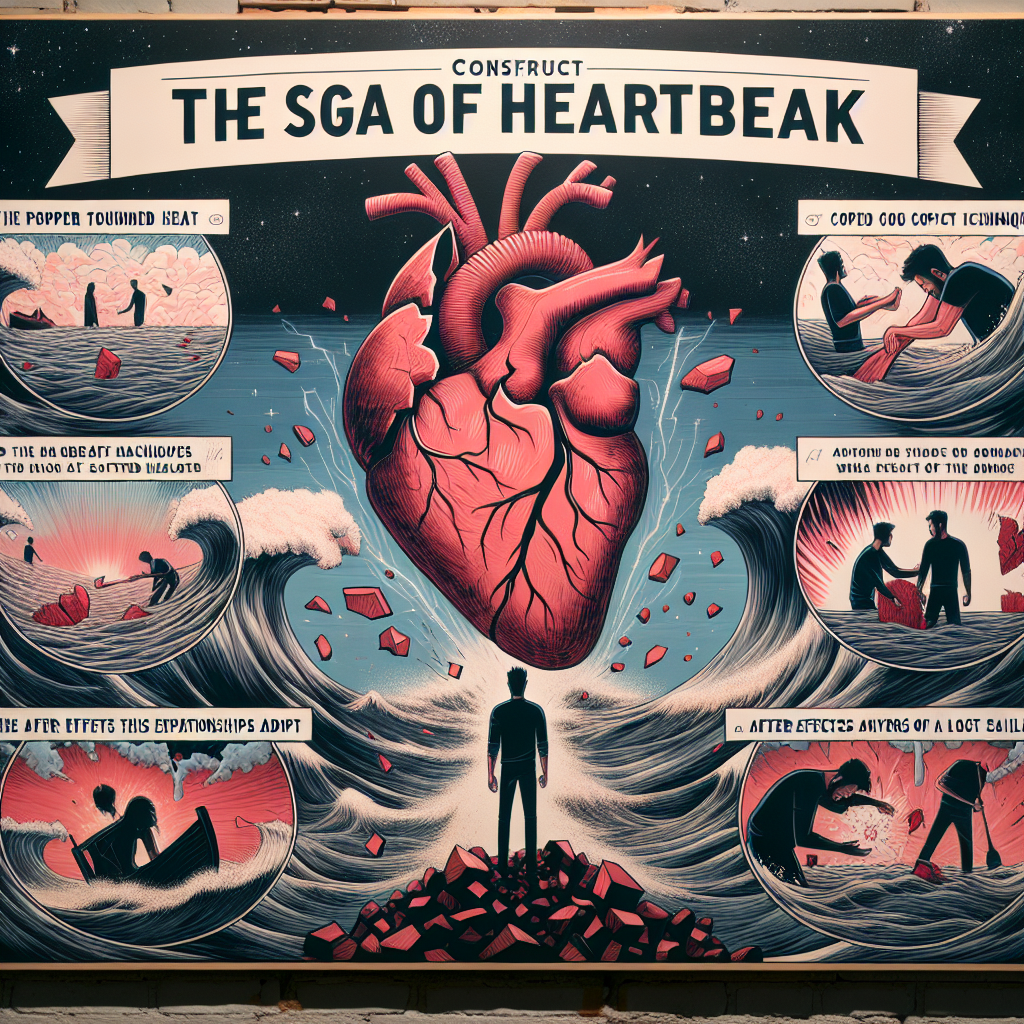Have you ever wondered just how many heartbreaks a person can experience in a lifetime? It’s a question that often lingers in the back of our minds as we navigate through the ups and downs of relationships. Whether it’s the painful end of a romantic partnership or the heartache that comes from a betrayal of trust, heartbreak is an inevitable part of the human experience. In this article, we will explore the varying degrees of heartbreak that one may encounter throughout their lifetime, offering insights and perspectives that may help you better understand and navigate through the pain.
Symptoms of Heartbreak
Emotional pain
Heartbreak often manifests as intense emotional pain. You may experience feelings of sadness, despair, and a deep sense of loss. It can feel as though your heart is physically aching, and the pain may intensify when you think about your past relationship or see reminders of your ex-partner.
Physical pain
Heartbreak can also have physical symptoms. It is not uncommon to experience headaches, stomachaches, and muscle tension. Your body may react to the emotional stress by manifesting in physical discomfort and pain.
Loss of appetite
Heartbreak can deeply affect your appetite. You may find yourself losing interest in food or feeling the inability to eat due to the emotional distress. This loss of appetite is a common symptom of heartbreak and can result in weight loss or nutritional deficiencies if not addressed.
Insomnia
Sleep disturbances are another symptom of heartbreak. You may find it difficult to fall asleep or stay asleep throughout the night. Thoughts and memories of the past relationship may invade your mind, making it challenging to find restorative rest.
Factors Influencing Heartbreaks
Number of relationships
The number of relationships you have had can influence the impact of heartbreak. If you have only experienced a few relationships, each heartbreak may feel more significant. Conversely, if you have been through multiple relationships, you may have developed coping mechanisms that can help you navigate heartbreak more effectively.
Length of relationships
The length of a past relationship can also influence the intensity of heartbreak. Longer relationships often create deeper emotional attachments, making the end of such a relationship more painful to bear. However, even shorter relationships can still cause heartbreak, as the emotional connection formed during that time can be significant.
Emotional attachment
The level of emotional attachment to a former partner plays a crucial role in how deeply heartbreak affects you. If you were deeply in love and emotionally invested in the relationship, the heartbreak may be more profound. The stronger the emotional connection, the harder it may be to let go and heal from the end of the relationship.
Resilience
Your level of resilience can impact how well you cope with heartbreak. Resilience refers to your ability to bounce back from adversity and maintain emotional well-being. If you have developed strong resilience, you may be better equipped to navigate the emotional turmoil of heartbreak and recover more swiftly.

Heartbreak Statistics
Varies for each individual
The experience of heartbreak varies for each individual. Factors such as personal coping mechanisms, support systems, and emotional resilience can influence how someone processes and recovers from heartbreak. While some individuals may overcome heartbreak relatively quickly, others may struggle with its effects for an extended period.
Average number of heartbreaks
It is challenging to determine an average number of heartbreaks a person may experience in a lifetime, as it varies significantly depending on various factors, including the individual’s approach to relationships and their resilience. Some people may experience few heartbreaks throughout their lives, while others may encounter heartbreak multiple times.
Frequency among different age groups
Heartbreak can occur at any age. While younger individuals may experience heartbreak due to the ending of teenage relationships or college romances, older individuals may face heartbreak as a result of the ending of long-term marriages or partnerships. The frequency of heartbreak may vary for different age groups based on their stage in life and relationship experiences.
Gender differences
Heartbreak can affect individuals of any gender, and there is no reliable evidence to suggest that one gender experiences heartbreak more frequently or intensely than another. Each individual’s experience of heartbreak is unique and influenced by personal emotions, attachment styles, and coping mechanisms rather than gender.
Effects of Heartbreak
Emotional distress
Heartbreak can cause significant emotional distress. You may experience feelings of sadness, grief, anger, and loneliness. The pain of heartbreak can be overwhelming and interfere with your daily life, causing difficulty concentrating, a loss of interest in activities, and a persistent feeling of sadness.
Impact on mental health
Heartbreak can have a profound impact on mental health. It can contribute to the development or exacerbation of conditions such as depression and anxiety. The emotional turmoil and stress can lead to feelings of hopelessness, low self-esteem, and a sense of worthlessness. It is crucial to seek support and professional help if you find that heartbreak is negatively impacting your mental well-being.
Decreased self-esteem
Heartbreak can often lead to a decrease in self-esteem. The end of a relationship can make you question your worth and desirability, leading to feelings of inadequacy. It is essential to remember that your self-worth is not defined by a relationship and to focus on rebuilding your self-esteem through self-care and self-reflection.
Difficulty trusting others
Heartbreak can make it challenging to trust others in future relationships. The pain of the past can create fear and vulnerability, leading to a hesitancy to open up to new romantic prospects. It is important to give yourself time to heal and work on building trust again, as trusting others is crucial for the success of new relationships.

Coping with Heartbreak
Seeking support from friends and family
During times of heartbreak, seeking support from friends and family can provide immense comfort and reassurance. Venting your emotions and talking through your feelings with loved ones can offer an outlet for your pain and help you gain perspective on the situation. Surrounding yourself with supportive individuals can remind you that you are not alone in your journey through heartbreak.
Engaging in self-care activities
Engaging in self-care activities can be beneficial in coping with heartbreak. Taking time for yourself and focusing on activities that bring you joy and relaxation can help distract from the pain and promote healing. Activities such as exercise, meditation, pursuing hobbies, and practicing self-reflection can contribute to your overall well-being during this challenging time.
Therapy and counseling
Professional therapy and counseling can be invaluable resources for navigating heartbreak. Therapists can provide guidance, support, and coping strategies tailored to your specific circumstances. They can help you process your emotions, gain insight into patterns in your relationships, and develop healthy strategies for moving forward. Seeking therapy or counseling can be a proactive step toward healing.
Taking time to heal
It is essential to give yourself time to heal from heartbreak. Trying to rush the healing process may result in unresolved emotions and hinder your ability to move on. Healing takes time, so be patient with yourself and allow yourself to experience the full range of emotions that come with heartbreak. Take this time as an opportunity to focus on personal growth and self-discovery.
Recovery from Heartbreak
Embracing self-growth
Heartbreak can be a catalyst for personal growth. Use this period as an opportunity to reflect on yourself, your values, and your goals. Explore your strengths and weaknesses, and focus on personal development. Embracing self-growth can help build resilience and prepare you for healthier and more fulfilling relationships in the future.
Learning from past relationships
Take the time to reflect on past relationships and the lessons they have taught you. Identify patterns or red flags in the relationships that led to heartbreak and use this knowledge to guide your future choices. Learning from past relationships can empower you to make more informed decisions in your romantic life and avoid repeating past mistakes.
Opening up to new possibilities
Although heartbreak can make you wary of new relationships, it is essential to remain open to new possibilities. Allow yourself to take chances and embrace the potential for love and connection. Opening up to new relationships can be a transformative experience and allow you to create healthier and more fulfilling connections.
Rebuilding confidence
Recovering from heartbreak involves rebuilding confidence in yourself and your ability to love again. Engage in activities that help boost your self-esteem and self-worth. Surround yourself with positive influences, practice self-compassion, and remind yourself of your worthiness of love and happiness. Rebuilding confidence takes time, so be patient and kind to yourself throughout the process.

Heartbreak as a Learning Opportunity
Understanding personal needs and boundaries
Heartbreak provides an opportunity to reflect on your personal needs and boundaries in relationships. Take the time to evaluate what you need and desire from a partnership, as well as the boundaries you want to establish to protect your emotional well-being. Understanding your personal needs and boundaries is essential for creating healthier and more fulfilling relationships in the future.
Identifying red flags in relationships
Heartbreak can be a chance to evaluate the red flags you may have missed in past relationships. Reflect on the warning signs or behaviors that were detrimental to your well-being. By identifying red flags, you can develop a greater awareness of what to look for in potential partners and avoid entering into similar harmful dynamics.
Reevaluating priorities and goals
The end of a relationship allows for reevaluating priorities and goals. This is a time to reassess what truly matters to you and determine whether your goals align with those of a potential partner. Adjusting your priorities can help you find more fulfilling and compatible relationships moving forward.
Developing emotional resilience
Heartbreak can foster the development of emotional resilience. By going through the process of healing and recovery, you can increase your ability to bounce back from adversity. Building emotional resilience involves cultivating coping mechanisms, seeking support when needed, and maintaining a positive outlook on life. Developing emotional resilience can lead to greater emotional well-being and the ability to navigate future heartbreaks more effectively.
Navigating Heartbreak in the Digital Age
Impact of social media on heartbreak
In the digital age, social media can significantly impact the experience of heartbreak. Seeing your ex-partner’s posts or updates can trigger painful emotions and hinder the healing process. It is crucial to establish healthy boundaries with social media and prioritize your emotional well-being. Consider limiting your exposure to your ex-partner’s online presence or taking a temporary break from social media altogether.
Digital reminders and memories
Digital reminders in the form of photographs, messages, or shared experiences can prolong the pain of heartbreak. It can be challenging to let go of the past when reminders are readily accessible. It may be beneficial to create a separate digital space or folder to temporarily store these reminders until you are ready to revisit them. Removing constant visual reminders can contribute to emotional healing.
Maintaining healthy online habits
During heartbreak, it is essential to maintain healthy online habits. Engaging in excessive online stalking or obsessively checking your ex-partner’s social media profiles can perpetuate feelings of sadness and prolong the healing process. Instead, cultivate healthy online habits by focusing on positive and uplifting content, connecting with supportive communities, and participating in activities that foster personal growth and self-care.
Building a positive support network
The digital age offers opportunities to connect with others who have experienced heartbreak. Online support groups, forums, and communities can provide a space to share experiences, seek advice, and receive support from individuals who can relate to your pain. Building a positive support network both offline and online can help you navigate heartbreak and gain new perspectives and insights.

Heartbreak in Different Cultures
Cultural perspectives on heartbreak
Different cultures have unique perspectives on heartbreak. Some cultures may emphasize the importance of familial or community support during times of heartbreak. Others may view heartbreak as a natural part of the human experience and encourage resilience and self-growth. Understanding cultural perspectives on heartbreak can provide valuable insights and alternative approaches to healing and recovery.
Traditions and rituals related to heartbreak
Various cultures have traditions and rituals related to heartbreak. These practices can provide comfort, closure, and a sense of communal support. Rituals such as mourning ceremonies or rituals of letting go can help individuals process their emotions and find solace in shared experiences. Exploring cultural traditions and rituals can offer additional avenues for healing.
Community support and healing practices
In some cultures, community support is a vital aspect of healing from heartbreak. Communities may come together to support individuals who are going through heartbreak, offering emotional support, guidance, and resources. These communal healing practices can provide a sense of belonging and aid in the process of recovery.
Interpersonal relationships within different cultures
Interpersonal relationships can vary across different cultures, influencing the experience of heartbreak. Cultural norms around dating, relationships, and marriage may shape individuals’ expectations and responses to heartbreak. Understanding these cultural nuances can help navigate the complexities of heartbreak within different cultural contexts.
Finding Love After Heartbreak
Taking time for self-reflection
After experiencing heartbreak, taking time for self-reflection is crucial before pursuing new relationships. Use this period to evaluate your own needs, desires, and emotional readiness. Reflecting on past experiences can help you identify areas of personal growth and ensure that you are entering new relationships with a healthy mindset.
Being open to new relationships
While it is essential to give yourself time to heal, it is also important to remain open to new relationships. Allow yourself to be vulnerable and explore the potential for love and connection. Although heartbreak may have left scars, it does not mean that you cannot find love again.
Maintaining healthy boundaries
Maintaining healthy boundaries is essential when entering new relationships after heartbreak. Take the lessons learned from past experiences to establish clear boundaries that protect your emotional well-being. Communicate openly with your partner about your needs and expectations, fostering a foundation of trust and respect.
Understanding personal growth
Heartbreak often leads to personal growth. Understand that you have undergone a transformative experience and allow yourself to embrace the positive changes that have occurred. Recognize the strengths and resilience you have cultivated through the healing process and carry this newfound wisdom into future relationships.
In conclusion, heartbreak is a painful and challenging experience that can impact us emotionally, physically, and mentally. The symptoms and effects of heartbreak may differ for each individual, influenced by factors such as the number and length of past relationships, emotional attachment, and resilience. Coping with heartbreak involves seeking support, engaging in self-care activities, and considering therapy or counseling. Recovery from heartbreak can lead to self-growth, learning from past experiences, and opening up to new possibilities. Heartbreak also presents an opportunity for personal reflection, understanding one’s needs and boundaries, and developing emotional resilience. Navigating heartbreak in the digital age involves managing the impact of social media, establishing healthy online habits, and building a positive support network. Heartbreak is experienced and addressed differently in various cultures, showcasing the importance of understanding cultural perspectives and traditions. Ultimately, finding love after heartbreak involves taking time for self-reflection, being open to new relationships, maintaining healthy boundaries, and embracing personal growth.


